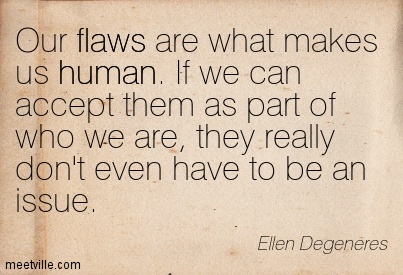Flaws
in Human Thought

Let’s face it, we are
not perfect. In fact we are far from it. And that includes our cognitive
functions. Humans have flawed logic. We cannot think clearly most of the time. Our
judgment is clouded by one thing or another. And you know what? At the center
of it all, we are the main problem in the flaws of our thoughts.
Majority of the time we
do not realize that we are the cause of our flaws. Or perhaps we just don’t
want to admit that we are. Because admitting would be one step further from
perfection. I know we all say that no one is perfect and that we aren’t trying
to be, but I feel like deep down we are all attempting to be the most perfect versions
of ourselves. I guess acknowledging that we strive towards an impossible goal
would be like admitting our naivety.
I guess that is one of
our flaws. We do not want to accept certain facts about ourselves. Facts that
contradict our ‘perfect’ view of ourselves. Humans tend to ignore whatever goes
against our versions of ourselves and this does not allow much room for self-improvement.
The first step in overcoming a problem is admitting you have one, right? So how
can we expect to alter ourselves for the better if we refuse to admit that we
are flawed.
In my human growth
class, we learned about how humans prefer a small immediate pay off rather than
to wait for a larger pay off in the future. This is called hyperbolic discounting.
That is flawed logic right there. We do not care for our future selves as much
as we care for the here and now versions of ourselves. Perhaps we do not feel
the need to care for the future us because we want to live in the moment. We want
a good life for the present. We want immediate rewards and immediate gratifications
because we never know what could happen in the future, so why count on the
payoff in the long run if we may actually never get there. This could be in
part due to our laziness because counting on a future requires thought and
planning. Maybe it is because we value our future selves less because they do
not seem quite as real as the present selves. Or perhaps it is our inability to
be certain of the future which hinders our logical reasoning.
Uncertainty is a scary
thing. Everyone is afraid of the unknown. Even the mere possibility of not
knowing what will happen produces an instant undesirable feeling somewhere deep
inside. For some reason incertitude makes us feel extremely uncomfortable, even
more uncomfortable than knowing that something negative will happen. I cannot
explain why we fear the unknown so much, but if you just don’t think about it
everything feels a little better.
Another speck in our
otherwise seemingly flawless thought process would be the gamblers fallacy. Humans
do not understand probability as well as we like to believe we do. It is
somewhat similar to uncertainty. We are not confident about the outcome, so we
hope for the best and try to forget that there is always a negative side to
every situation.
People tend to believe
that future probabilities are somehow altered by past events, when in reality
probabilities are fixed no matter what. Like flipping a coin for example. The probability
of the coin landing on heads is 50%, no matter if you got tails in the past
three flips.
People believe in
another thing called hope. We all hope for the favourable outcome and past
events cloud our judgement of future events. We think that just because
something happened so many times in the past, what are the odds that it will
happen again? Or in case it is something positive we believe that it will
reoccur or that somehow it is more likely to happen because we so desperately
want it to happen. Like playing the lottery. We know the chances of winning are
slim next to none, yet our the hope in a favourable outcome and the desire for
a better life overrides our reasoning and proper judgment and we end up playing
over and over again. Each time believing that our odds are somehow better than
the first time. Each time finding a reason to justify our belief in the
increased odds, like looking for a story online about someone who has won or
talking to someone you know about a friend of a friend of a friend who knows a
friend of a friend of someone who won. Like knowing about the one in a million
lucky duck who happened to win increases your chances.
We humans are peculiar
creatures who tend to avoid blaming ourselves for our flaws. Who tend to have
difficulty accepting facts threatening our self-images. Who fear the future and
the unknown. Who believe in hope and desire. Who have trouble with figuring out
probability. Who allow our clear mental states to be shadowed with doubt, desire
and dreams. We are flawed, there is no doubt about it, but we are human and accepting
imperfection is what being human is all about.
No comments:
Post a Comment